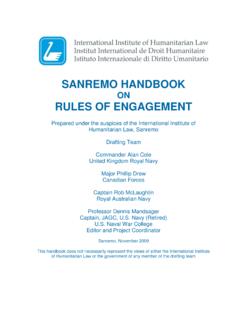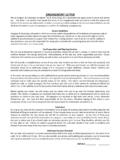Transcription of NATIONAL TAX PRACTICE INSTITUTE LEVEL 1 …
1 NAEA NATIONAL TAX PRACTICE INSTITUTE LEVEL 1 engagement Letters August 6, 2012 Claudia Hill, EA, MBA Claudia Hill, EA, MBA is a nationally recognized tax professional and frequent lecturer on taxation of individuals, tax planning, and representation before IRS, including at IRS Tax Forums. She is editor-in-chief of the CCH, Inc., Journal of Tax PRACTICE and Procedure. Hill has testified before both the Senate Finance Committee and House Ways and Means Committee. Hill served on the 1987 Commissioner s Advisory Group to the NATIONAL Office of the Internal Revenue Service. She is often called upon by the media for comments about tax issues. Hill was recently named a Top Ten Nominee by Tax Analysts for 2011 Person of the Year.
2 She is an NTPI Fellow and LEVEL 1 and Graduate LEVEL in Representation instructor. NAEA Claudia Hill, EA, MBA i engagement Letters Table of Contents Section Best Practices ..1 Best Practices Checklist ..2 engagement Letter ..2 Protecting Your Client s Right to Control Information Flow ..3 Advisor-Client Privileges Against Disclosure Exhibit: Confidentiality Privilege engagement Letter ..4 Exhibit: Tax Preparation engagement Letter - Late-Filed Returns ..5 Exhibit: Examination engagement Agreement ..6 engagement Agreement, Supplement ..7 General Information Regarding Audit engagement Exhibit: engagement Agreement Collection Representation ..8 Sec. Conflicting Interests ..10 Exhibit: Conflict Of Interest Informed Consent Letter/Separate Representation.
3 11 Exhibit: Conflict Of Interest Joint Return Protecting Our Practices and Ourselves: Disengaging from problem or risky clients ..13 Exhibit: Disengagement Due To Divorce Conflicts ..14 Exhibit: Disengagement from a Client Due To Problem Behavior..15 Conclusion ..16 NAEA Claudia Hill, EA, MBA 1 engagement Letters Circular 230, Subpart B -- Duties and Restrictions Relating to PRACTICE before the Internal Revenue Service, Section Best Practices (a) Best practices. Tax advisors should provide clients with the highest quality representation concerning Federal tax issues by adhering to best practices in providing advice and in preparing or assisting in the preparation of a submission to the Internal Revenue Service.
4 In addition to compliance with the standards of PRACTICE provided elsewhere in this part, best practices include the following: (1) Communicating clearly with the client regarding the terms of the engagement . For example, the advisor should determine the client's expected purpose for and use of the advice and should have a clear understanding with the client regarding the form and scope of the advice or assistance to be rendered. (2) Establishing the facts, determining which facts are relevant, evaluating the reasonableness of any assumptions or representations, relating the applicable law (including potentially applicable judicial doctrines) to the relevant facts, and arriving at a conclusion supported by the law and the facts.
5 (3) Advising the client regarding the import of the conclusions reached, including, for example, whether a taxpayer may avoid accuracy-related penalties under the Internal Revenue Code if a taxpayer acts in reliance on the advice. (4) Acting fairly and with integrity in PRACTICE before the Internal Revenue Service. (b) Procedures to ensure best practices for tax advisors. Tax advisors with responsibility for overseeing a firm's PRACTICE of providing advice concerning Federal tax issues or of preparing or assisting in the preparation of submissions to the Internal Revenue Service should take reasonable steps to ensure that the firm's procedures for all members, associates, and employees are consistent with the best practices set forth in paragraph (a) of this section.
6 PRACTICE Pointer! Clearly, the best way to Communicating clearly with the client regarding the terms of the engagement is through the usage of engagement letters. The IRS characterizes the above standards as "aspirational;" t hey are procedures that tax advisors "should" rather than "must" follow. Failure to comply with "best practices" does not automatically subject a practitioner to sanctions. However, failure may make it more likely that a practitioner might overlook one of the other, mandatory rules. In addition, some practitioners are concerned that these standards may be raised during any malpractice litigation. NAEA Claudia Hill, EA, MBA 2 engagement Letters Best Practices Checklist Although each tax services firm is advised to review their own particular circumstances before adopting any procedural checklist, the following is prepared based on the "best practices" outlined by the IRS in Circular 230, section Did I communicate clearly with the client regarding the terms of the engagement ?
7 Did I establish the facts, determine which facts are relevant, evaluate the reasonableness of any assumptions or representations, relate the law to the relevant facts, and arrive at a conclusion supported by the law and the facts? Did I advise the client on the consequences of the conclusions reached? Did I advise the client if relying on my advice will help the client avoid an accuracy-related penalty? Did I act fairly and with integrity when practicing before the IRS? Did I provide the client with the highest quality representation by adhering to best practices in providing advice and in preparing or assisting in the preparation and submission of documents to the IRS?
8 Has the firm taken reasonable steps to ensure that procedures for all members, associates, and employees are consistent with the above best practices? engagement letters define the services the preparer or advisor is being engaged to perform; identifies engagement responsibilities of both the advisor and the client; explains fees, billing, and payment terms; and assures the client that additional services will not be initiated without advance approval. engagement letters should be customized for the specific circumstances of the engagement (return preparation, audit, advice or research) and the needs of the organization. Consider the following when creating engagement letters for your practice1.
9 Treasury Circular 230, Standards of PRACTICE NAEA s Code of Ethics and Rules of Professional Conduct AICPA Statements on Standards for Tax Services State law relating to disclosure of finance charges State Board of Accountancy rules regarding disclosure of outside processing, if applicable Value of signed confirmation of arrangements when dealing with complex matters, and 1 See NAEA Claudia Hill, EA, MBA 3 engagement Letters Need for separate engagement letter, or separate language, for separate services (such as providing privileged tax advice, or preparing certain state returns) Protecting Your Client s Right to Control Information Flow Advisor-Client Privileges Against Disclosure IRC 7525(a)(1) extends the confidentiality privilege which exists for attorneys to tax advice given to taxpayers by federally authorized tax practitioners.
10 An authorized tax practitioner includes non-attorneys authorized to PRACTICE before the Internal Revenue Service and includes Enrolled Agents, Enrolled Actuaries, and Certified Public Accountants. Tax advice means any advice given by an individual with respect to a matter that is within the scope of the individual's authority to PRACTICE before the IRS. The privilege may be asserted in any non-criminal tax matter before the IRS and in any non-criminal tax proceeding in Federal court and may be asserted to the extent such communication would be considered privileged communication if it were between a taxpayer and an attorney. The privilege does not apply to any written communication that (1) is made in connection with the promotion of any person's direct or indirect participation in any tax shelter, and (2) is made between a federally authorized tax practitioner and the person; any director, officer, employee, agent or representative of the person; or any other person holding a capital or profits interest in the person.








